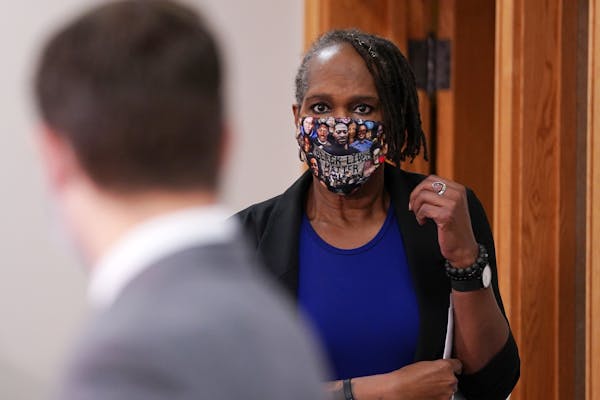There were hundreds of calls from impassioned residents. Accusations of deception. A flurry of phone calls seeking vote tallies. A mayoral veto threat and a flip-flop by the council vice president.
At the end of a dramatic week, though, the Minneapolis City Council and Mayor Jacob Frey united to adopt a city budget that will trim the Police Department to create new mental health teams, boost violence prevention programs and redirect some nonviolent 911 calls to other city departments.
Reaching agreement on the 2021 budget — their first full one since George Floyd's death — meant overcoming divisions that reflected sharp differences in public opinion. While some residents wanted city leaders to make more drastic cuts to the police, others urged them to keep staffing intact as the city struggles with a rise in violent crime.
"Of course, with George Floyd's killing with MPD and the summer with shifting crime rates and increases in homicides and carjackings, there's a lot of scrutiny on all of the public safety work," Council President Lisa Bender said. She said the budget negotiations reflected the city leaders' struggle to balance "how to talk about this very long-term investment in examining our public safety system in this particular moment in our city's history."
At times, the council members publicly clashed and questioned one another's motives. Other days, they attempted to be conciliatory.
They entered the week with a plan to cut an additional $8 million from the $179 million that Frey had proposed for the Police Department next year.
Already on the table was one compromise, which would use $5 million of excess money in the city's general fund to offset cuts to police overtime. Chief Medaria Arradondo said the overtime money was desperately needed to ensure officers can respond to 911 calls while they are short-staffed amid a wave of resignations and PTSD claims.
There was one caveat: that the money would be placed in a new reserve fund and would be released only at the council's discretion next year.
Council Member Jeremy Schroeder, who wrote the proposal to offset the cuts, described it as an effort to increase accountability and transparency and to avoid ultimately having to take money out of the city's contingency fund. The city's agreement with the police union says they are entitled to overtime if they work more than a certain number of hours each month.
"I'm very certain we're going to need that money for overtime," Schroeder said in a public meeting last week. Still, he said, he believes police funding deserves more scrutiny.
Council members worked individually through each component of the plan during a lengthy meeting Monday, signing off on it with few changes. Along the way, they considered several amendments. Council Member Linea Palmisano, chairwoman of the budget committee, wrote many of them and often sought to fund the same concepts, but without cutting the police budget at the same levels.
"It was about getting buy-in, for trying to get seven votes," she said, referring to the number of votes needed for an item to pass. "It was about trying to appeal to as many of my colleagues as possible, while also trying to capture the spirit that I thought everybody would agree on."
Most of her proposals failed by a narrow margin.
Another part of the plan — written by Bender, Phillipe Cunningham and Steve Fletcher — narrowly passed and prompted Frey to threaten to veto the budget.
While his plan would have about 770 officers working in 2021, he wanted to keep the authorized force size listed at its current level of 888 to clear the way for hiring more officers in future years. The council voted 7-6 Monday to drop it to 750. Some council members said they thought that was more reflective of the force's true size, and that leaving the target level listed higher was misleading.
Losing that fight meant Frey would also lose some political leverage next year, when the 2022 budget is voted on. If he wanted to hire back close to that 888 number, he would have to ask a council — with nine members who had pledged to end the department — to consider increasing the budget beyond its initial projected size.
The mayor issued a statement saying he was worried about a "massive, permanent cut to officer capacity."
In the two days that followed, city leaders exchanged phone calls with one another, many conducting unofficial vote counts as they tried to predict whether they could usher in last-minute changes or uphold the ones they had already made.
Late Wednesday night, shortly before they had to take a final vote on the city's entire spending package, they voted 7-6 to maintain the authorized force at 888, reversing their decision from Monday. Council Vice President Andrea Jenkins was the swing vote.
"The reality right now is that Chief Arradondo is woefully understaffed for a variety of reasons," Jenkins said in the meeting. "Do I believe that this effort will resolve all of our problems, all of our crime issues overnight? Absolutely not. Neither will all of the social service programs and initiatives. It's going to take all of these things together to lower the crime rate."
That change brought Frey on board, and he signed the budget Friday.
The mayor said he supported many of the council's proposals but, for him, the argument was "fully and exclusively" about whether to fund the new programs at the expense of the Police Department.
"Never once did any member of the council put forward anything that would go against safety beyond policing," he said. "That is an area of complete unity."
Liz Navratil • 612-673-4994
8 months in jail for Blaine man who caused 120-mph crash hours after he was caught speeding

Daughter sues St. Paul, two officers in Yia Xiong's killing

